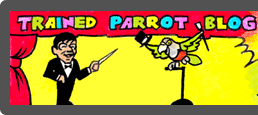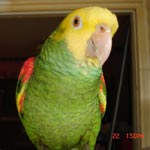[list=][/list]
Hi, we have 2 blue fronted mating amazons Ava and Roco and it's worrying to see them now, Ava has laid at least one egg but get get close enough to check quantity.
Roco, well he now wants to attack everytime we go in the room, as he is not the best flyer it's from the top of the cage that he is raving from, which causes Ava to come from her nesting box, now she could fly straight at me if she wanted and now looks as though she would do it at anytime, I can see the rage in her, well in them both, it's deadly trying to change their food and water!!
Any suggestions welcome please!
Thanks
Elchippo



Blue fronted parrots hormonal period
5 posts • Page 1 of 1
- Elchippo
- Parakeet
- Gender:

- Posts: 1
- Number of Birds Owned: 2
- Types of Birds Owned: 1 male amazon blue fronted
1 female amazon blue fronted - Flight: Yes
Re: Blue fronted parrots hormonal period
If they are in their own room you can feed and water with a tray. Then just trade trays in morning and evening.
-

liz - Macaw
- Gender:

- Posts: 7234
- Location: Hernando FL
- Number of Birds Owned: 12
- Types of Birds Owned: DYH Amazon Rambo
BF Amazon Myrtle
Cockatiels: Shadow Tammy Flutter Phoenix Jackie
Andy Impy Louise Twila Leroy - Flight: Yes
Re: Blue fronted parrots hormonal period
Hi, Elchippo and bluefronts! Welcome to the forum. Yes, breeding season is very hard when you have a bonded pair of zons with a nest. I have a pair of Yellow Napes and well know what you are talking about. You don't say how old they are, how long you've had them, what diet and light schedule they are under and what is your routine with them - and ALL these questions give us answers that have a direct effect on their behavior. Let me explain. All male amazons get VERY defensive when their bonded mate is nesting - this is a fact that cannot be changed because it's driven by sexual hormones and 'programmed' into their genes by evolution (survival of the species). BUT when the diet and the light schedule is not the right one, you end up with birds that are not 'normally' hormonal -which is bad enough- but OVERLY hormonal, and that is REAL BAD because the bird is in chronic pain and has way too many sexual hormones in their bloodstream (sexual hormones = aggression). It's unhealthy for them and very dangerous to people because an animal in pain is always a dangerous animal. This is a fact and not an opinion.
Age makes a difference because, normally, very young birds (under 4 years of age) kept right tend to have milder breeding seasons compared to birds that are older (more than 4 but less than 25). And the length of time you've had them also makes a difference because their aggression is driven exclusively by distrust. Basically, they are protecting their mate, nest, eggs and, later, babies but when the bird is used to the human and has already reached the conclusion that the human presents no threat, they are more... how should I put it? patient? tolerant? of its presence in their 'territory'. Now, this is determined not only by the number of years the birds have been with you but also by the way you treat them. I used to have problems with mine because the male had been severely abused by his previous owner (he was punched several times) and distrusted and hated humanity in general but, as the years went by and he realized that I was very respectful of his space, mate, nest and eggs (there are never any babies because I don't breed them, I just let them go through the motions of breeding) he 'calmed down' to the point that I can do what I need to do without getting attacked BUT this does not mean that I am not careful - I am! And very much so!
Now, there are tricks I use and I will share them with you. 1) Their cage is in the opposite corner of the room to where the door is and their nest is always inside the cage (the cage is always open and has nothing inside because they actually live cage-free but I always put the cardboard boxes they use as a nest inside the cage (I throw them in from as far a distance as I can manage)
2) I feed them on top of another cage which is in front of the door (so, when they are eating there, I can go around to the other side and throw the 'new' box into their cage - this is because they chew many boxes before she lays any eggs inside the one that ends up being the 'nest')
3) I always tell them what I am doing so nothing catches them by surprise - so, when I feed them, I use always the same phrase to indicate this ("Que rica papa! Yummy yummy for the tummy")- same thing for water ("Water! Thirsty... water!") and, again, also for a new box (Ooooooh, LOOK LOOK LOOK! BOX!!!). Always using the same word or phrase when you do an action teaches them what it means and, once they learn it, they know what is coming so they don't overreact or mistake your action for something else.
4) During breeding season, I keep my eye on him ALL THE TIME and, if I see him getting ready to fly out to me (they crouch a bit and lower their head while staring at you), I immediately make a noise (CAW CAW CAW) and a hand movement (I make my right hand into a 'bird's beak' and move it as if I was pecking) that means 'I see you and I am warning you that I will retaliate'. He knows what this means because this is what I used to do every time he attacked me or tried to bite me (this bird has made holes in my head). I never actually touch him but I react the same as another strong bird would to one attacking, meaning, I do not back out or not say anything (only a weaker bird would do that), I 'vocalize' loudly and make aggressive gestures to 'warn' him that I will retaliate.
When Zeus first came to me, nothing really worked. He had not been cared for properly for years so he was overly hormonal, fell in love with Precie at first sight and hated/distrusted all humans so handling him cage-free was a challenge because he tended to attack first and question later so what I did was walk into the birdroom with a corn broom in my hand upside down (the sweeping side up) in front of me. This did not only intimidate him but also gave me a 'shield' in case he flew out to attack me
so what I did was walk into the birdroom with a corn broom in my hand upside down (the sweeping side up) in front of me. This did not only intimidate him but also gave me a 'shield' in case he flew out to attack me
BUT the real key to managing bonded male amazons in breeding season is:
1) to keep them from becoming overly hormonal through the right kind of diet all year round and a super strict solar schedule with full exposure to dawn and dusk (nothing will work if they are overly hormonal)
2) to teach them that they can trust you (always be respectful of their space, NEVER try to touch the female or mess with their nest and forget about checking the nest to see how many eggs they have in there)
3) to teach them phrases/words that let them know what you are going to be doing (but mind you, don't try to fool them by saying one thing and doing another because parrots think like humans do and they will figure it out and you will lose the trust they have in you).
Hope this helped you and let me know if there is anything that needs clarification.
Age makes a difference because, normally, very young birds (under 4 years of age) kept right tend to have milder breeding seasons compared to birds that are older (more than 4 but less than 25). And the length of time you've had them also makes a difference because their aggression is driven exclusively by distrust. Basically, they are protecting their mate, nest, eggs and, later, babies but when the bird is used to the human and has already reached the conclusion that the human presents no threat, they are more... how should I put it? patient? tolerant? of its presence in their 'territory'. Now, this is determined not only by the number of years the birds have been with you but also by the way you treat them. I used to have problems with mine because the male had been severely abused by his previous owner (he was punched several times) and distrusted and hated humanity in general but, as the years went by and he realized that I was very respectful of his space, mate, nest and eggs (there are never any babies because I don't breed them, I just let them go through the motions of breeding) he 'calmed down' to the point that I can do what I need to do without getting attacked BUT this does not mean that I am not careful - I am! And very much so!
Now, there are tricks I use and I will share them with you. 1) Their cage is in the opposite corner of the room to where the door is and their nest is always inside the cage (the cage is always open and has nothing inside because they actually live cage-free but I always put the cardboard boxes they use as a nest inside the cage (I throw them in from as far a distance as I can manage)
2) I feed them on top of another cage which is in front of the door (so, when they are eating there, I can go around to the other side and throw the 'new' box into their cage - this is because they chew many boxes before she lays any eggs inside the one that ends up being the 'nest')
3) I always tell them what I am doing so nothing catches them by surprise - so, when I feed them, I use always the same phrase to indicate this ("Que rica papa! Yummy yummy for the tummy")- same thing for water ("Water! Thirsty... water!") and, again, also for a new box (Ooooooh, LOOK LOOK LOOK! BOX!!!). Always using the same word or phrase when you do an action teaches them what it means and, once they learn it, they know what is coming so they don't overreact or mistake your action for something else.
4) During breeding season, I keep my eye on him ALL THE TIME and, if I see him getting ready to fly out to me (they crouch a bit and lower their head while staring at you), I immediately make a noise (CAW CAW CAW) and a hand movement (I make my right hand into a 'bird's beak' and move it as if I was pecking) that means 'I see you and I am warning you that I will retaliate'. He knows what this means because this is what I used to do every time he attacked me or tried to bite me (this bird has made holes in my head). I never actually touch him but I react the same as another strong bird would to one attacking, meaning, I do not back out or not say anything (only a weaker bird would do that), I 'vocalize' loudly and make aggressive gestures to 'warn' him that I will retaliate.
When Zeus first came to me, nothing really worked. He had not been cared for properly for years so he was overly hormonal, fell in love with Precie at first sight and hated/distrusted all humans so handling him cage-free was a challenge because he tended to attack first and question later
BUT the real key to managing bonded male amazons in breeding season is:
1) to keep them from becoming overly hormonal through the right kind of diet all year round and a super strict solar schedule with full exposure to dawn and dusk (nothing will work if they are overly hormonal)
2) to teach them that they can trust you (always be respectful of their space, NEVER try to touch the female or mess with their nest and forget about checking the nest to see how many eggs they have in there)
3) to teach them phrases/words that let them know what you are going to be doing (but mind you, don't try to fool them by saying one thing and doing another because parrots think like humans do and they will figure it out and you will lose the trust they have in you).
Hope this helped you and let me know if there is anything that needs clarification.
- Pajarita
- Norwegian Blue
- Gender:

- Posts: 18705
- Location: NW Pa
- Number of Birds Owned: 30
- Types of Birds Owned: RoseBreasted too, CAG, DoubleYellowHead Amazon, BlueFront Amazon, YellowNape Amazon, Senegal, African Redbelly, Quaker, Sun Conure, Nanday, BlackCap Caique, WhiteBelly Caique, PeachFace lovebird, budgies,
- Flight: Yes
Re: Blue fronted parrots hormonal period
I think one this that might need clarification is: How do you swap out, poke, or addle the eggs without getting to the nest?
- Navre
- African Grey
- Gender:

- Posts: 1909
- Number of Birds Owned: 2
- Types of Birds Owned: Turquoise Green Cheek Conure
Hooded Parrot - Flight: Yes
Re: Blue fronted parrots hormonal period
Ahhh, yes, good catch, John! I wait until they are both eating and sneak to the cage where they have the nest with a plastic egg in my hand and, while always keeping my eye on Zeus, very quickly do the switch of the new egg for the plastic one (I carry the broom with me but have it right side up -which doesn't bother them at all- and use the door of the cage as a potential shield -just in case). Precie has never laid more than two eggs so it's not as if I need to do this often. I no longer addle eggs, I had an eggcident where the addling did not work and a baby was born so I started using plastic eggs from then on (I was horrified that a baby could have been born with defects from my shaking the egg).
- Pajarita
- Norwegian Blue
- Gender:

- Posts: 18705
- Location: NW Pa
- Number of Birds Owned: 30
- Types of Birds Owned: RoseBreasted too, CAG, DoubleYellowHead Amazon, BlueFront Amazon, YellowNape Amazon, Senegal, African Redbelly, Quaker, Sun Conure, Nanday, BlackCap Caique, WhiteBelly Caique, PeachFace lovebird, budgies,
- Flight: Yes
5 posts • Page 1 of 1
Who is online
Users browsing this forum: No registered users and 18 guests
